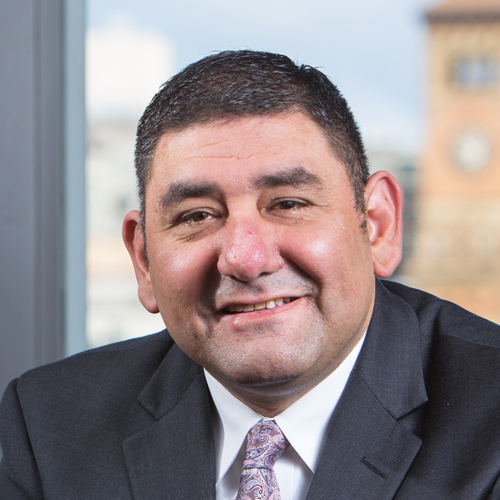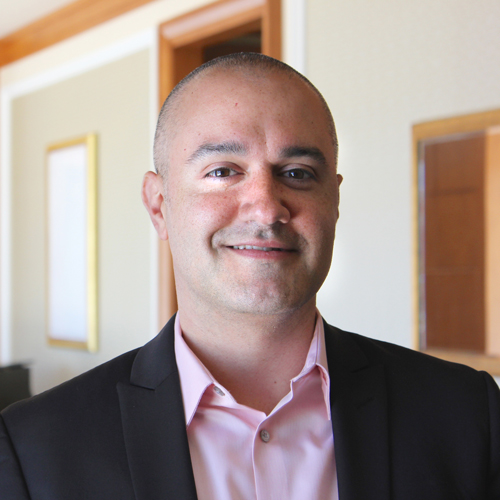“We don’t steal here,” warned the Episcopalian nun. It was Yolangel “Yogi” Hernandez Suarez’s first day of fourth grade at St. Hilda’s & St. Hugh’s school in New York City. It was the ’70s, and the nun had pulled her Latina mother aside. “Good,” said her mother. “Because we don’t either.”
Hernandez Suarez was born in New York the year after her two young parents emigrated from Cuba. Her mother was an early feminist who instilled in her daughter an intrinsic appreciation for women’s empowerment and human rights. Both parents raised her to work hard, be honest, and never let others determine her limitations. They also held her education as a top priority—hence her attendance at St. Hilda’s.
While the nuns may have initially made an incorrect assumption about Hernandez Suarez, they turned out to be brilliant teachers. As highly educated and dedicated instructors, the nuns were early examples of strong female leaders in Hernandez Suarez’s life and demonstrated the importance of both learning and of serving those less fortunate. They also taught Hernandez Suarez the powerful impact that mentors can have on young minds.
Hernandez Suarez went on to attended Swarthmore College, an institution with Quaker roots that she credits with solidifying many of her foundational values—her inclusive mind-set and passion for social justice. She planned to finish her bachelor’s degree in biochemistry and jump right into a PhD, but during an internship at a hospital, another important female mentor made a life-changing suggestion: “You’re so good with people,” she said. “You should be a doctor.”
So, Hernandez Suarez applied to Johns Hopkins University School of Medicine. At the time, the university was putting heavy emphasis on developing industry leaders—people who would challenge the status quo in healthcare at the highest level. During Hernandez Suarez’s interview, the associate dean expressed concern that, as a Latina, she would use her Johns Hopkins education simply to help struggling Hispanic communities. “What would you do if given this opportunity?” he asked.
“I want your job someday,” she answered. After the interview, Hernandez Suarez was worried she had blown it by being too forward, but her gumption had actually made a positive impression. She was accepted and awarded a generous scholarship.
At Johns Hopkins, Hernandez Suarez met her husband, Dr. Jeff Simmons, and they were married between their second and third years of school. When Simmons was given the opportunity to train in cardiology at the Jackson Health System a few years later, they moved to Miami where Hernandez Suarez went into private practice as an ob-gyn and served the women of Miami Beach for more than ten years.
But academia came calling again when Hernandez Suarez was recruited to a faculty position at the University of Miami. She fell in love with the nonprofit sector and soon became vice president of ambulatory services for Jackson Health, where she oversaw a network of primary and specialty services for Miami-Dade County. “I owe a lot of what I understand about healthcare to the time I spent at UM and the Jackson Health System,” she says. She also earned her MBA at UM during that time.
Five years later, Hernandez Suarez was recruited again, this time to be associate dean for graduate medical education at the Herbert Wertheim College of Medicine at Florida International University. “It was an opportunity to design curriculum for a new medical school whose mission was to train doctors to care for the community,” she says. “I couldn’t say no.”
But when the cold call came about a chief medical officer position at Humana, Hernandez Suarez was surprised. “Have you seen my résumé?” she asked the senior recruiter. “I’ve spent my entire career in the public sector and I have no earnings per share—except in heaven for serving the community!” They had, indeed, seen her résumé and believed she was exactly right for Humana.
Today, Hernandez Suarez is VP and chief medical officer for Humana’s Care Delivery Organization and is responsible for all of Humana’s wholly owned clinics across Florida, Texas, and South Carolina. These clinics have a special focus on seniors, are staffed by more than 250 doctors, and provide the highest-quality care to more than 100,000 patients. “Humana is a healthcare company—not just an insurance company,” Hernandez Suarez says. “We truly touch patients on their journeys to wellness.”
The Affordable Care Act created a paradigm shift to healthcare financing by mandating that 85 percent of all healthcare dollars be directly invested in patient care. Humana believes that the best way to do this is through value-based care—maximizing the total health of patients over their lifespans. Doctors must now be trained and empowered to improve quality of care, and rather than simply diagnosing illness and prescribing treatment, they are expected to suggest affordable options and total-body preventative action. “If you don’t have an understanding of the system in which healthcare functions,” Hernandez Suarez says, “you won’t be able to do right by your patients.”
“It’s my job to ensure that we are investing in the right resources—healthcare professionals, technology, social services, policy advocacy—that improve their health for the long haul.”
For Hernandez Suarez, achieving the best health for patients means regularly engaging a diverse group of experts to understand, interpret, and address these complexities. “Doctors, nurses, social workers, policy-makers, community representatives, nutritionists, civic planning, lawyers, and others are all at the table,” Hernandez Suarez says. “It’s that spirit of inclusion that allows all of our voices to be heard, and it’s my job to facilitate those voices to get to a solution.”
Hernandez Suarez likens her work to that of an air traffic controller who must be able to pay attention to planes that are landing, as well as those flying in the air. She simultaneously considers patients who come to clinics seeking care, and those in their homes and communities. “I wake up every morning with 100,000 people to worry about,” she says. “It’s my job to ensure that we are investing in the right resources—healthcare professionals, technology, social services, policy advocacy—that improve their health for the long haul.”
To do that, Humana has established a company-wide bold goal. “We are committed to improving the health of the communities we serve by 20 percent by 2020,” Hernandez Suarez says. “It’s one of the things that drew me to Humana.” Special task forces have been assembled in communities to investigate and assess each population’s health and begin addressing needs. Whether it’s poverty, hunger, mental health, or physical health challenges, these groups are invested in understanding the total-body needs of constituents at every stage of life.
At the heart of Hernandez Suarez’s leadership is authenticity. Wherever she goes she remains consistent, and her integrity, honesty, and work ethic precede her. She carries her mother’s heart for empowerment, the nuns’ passion for justice, and her professors’ conviction for inclusion into her work every day, which has inspired a culture of trust and collaboration among her teams at Humana.
“I am bold because I have been emboldened,” she says, following in the footsteps of the strong female leaders before her by standing up for patients, speaking up for the voiceless, and inspiring others to follow her lead.

